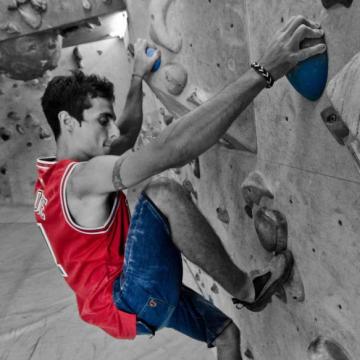The research theme on AI and education aims at applying some of the IIIA AI techniques to the field of education. It does not aim at completely automating some processes and replacing the human component, but supporting the human through mechanisms like team formation that allow for building more efficient teams, or peer-based assessments that support assessments in massive online courses.
Contact: Carles Sierra

It is always challenging to make predictions about the impact of technology on an economic or social sector. However, all recent analysis make it clear that repetitive tasks, or those with little added value by the humans who perform them, are going to be redesigned to facilitate their automation through the use of Artificial Intelligence (AI) techniques. Banking and commerce are examples of sectors that are undergoing a profound transformation, partly enabled by AI techniques such as chat-bots or personalization systems, leading to a notable reduction in employment. On the contrary, the education sector will continue to need the human component, and permanently, since the school fulfils an essential socializing function for the development of people. This need does not mean that AI is not going to impact educational processes; it has; it does and will continue to do so.
Today we have numerous AI applications, not necessarily developed specifically for education, but which are very useful in the education world. For example, automatic subtitling of videos, tutoring systems that interact in natural language, or the realistic conversion of text to human speech.
AI, in its origins, was already applied to education, in particular personalized education. Adapting the contents to each student is a pedagogical imperative that is difficult for teachers to achieve when the groups are large or the economic resources dedicated to education are limited. Several research groups developed simple systems of personalized education in the 1960s. Today, these systems have reached a remarkable level of sophistication. For example, over the past 15 years, the ALEKS system (aleks.com) developed in the United States has improved the performance of millions of students in mathematics. This system raises problems with an open response, analyses the answer and, thanks to a machine learning system, identifies errors and skills not acquired to explain the error to the student and recommend new problems that help to obtain the necessary skills. This type of system continues to be developed in different countries. The one created by Squirrel AI in Shanghai with more than three million students, and with a great improvement in individual performance is noteworthy (http://squirrelai.com/product/ials). We will no doubt see these systems more frequently over the next decade and covering areas increasingly distant from STEM, where they focus on today.
Collaborative Learning
Social phycology, AI and Ethics together can provide valuable models for peer feedback and teamworks
Team Formation
Global economy demands to restructure education to encourage entrepreneurship, creativity and risk-taking. Learning based on teamwork is the path to follow. Within collaborative and task-based education, one of the recurring problems is how to form teams of students. AI allows the analysis of a multitude of factors (sociological, competence, psychological, etc.) to explore the enormous space of possible combinations and find the optimal teams of students in different scenarios and contexts.
Peer Evaluation
Progress will be made in automatic and peer evaluation processes, which will further democratize education online and throughout life. Advances in natural language processing and computer vision combined with explanation techniques will make the self-assessment that systems provide to students much more informative and useful. Likewise, peer assessment combined with AI techniques will allow the assessment of large groups of online education to be acceptable to teachers.
Lesson Plans
There are a number of available tools that support teachers in the management of lesson plans on the web. However, none of them is task-centred and support any form of lesson plan's execution over the web. At IIIA, we are interested in the design and execution of these pedagogical workflows. Our Lesson Plans allows to coordinate interactions, ensuring the rules set by the lesson plan are followed, where lesson plans are designed with respect to a selected rubric. Once the lesson plan is defined, a specific graphical user interface (GUI) is automatically generated to allow students navigate through the lesson. Every time the tutor modifies a workflow, a new GUI is generated accordingly without any programming effort.
Personalised Learning
Hybrid recommender systems and learning analytics allows creating custom-made contents and learning itineraries.
Based on data analytics, Artificial Intelligence algorithms can provide a learning context for the particular needs of students or group of students. We study and create models and algorithms that automatically recommend custom contents and create learning itineraries for the learning needs of students.
Serious Games
Combine Virtual Reality, AI and gamification to promote learning by playing.
Artificial Intelligence and Virtual Reality provide a rich environment for game-based learning, also called serious games. We develop new personalisation techniques that can be integrated in virtual games to create learning environments where to study and practice several subjects in an inmersive and entretained way.
IIIA develops AI-based software components to offer schools and teachers tools to implement at classrooms. Our toolbox currently offers tools for peer assessments, team composition and lesson plans creation and execution. In what follows, you can play with and test the different demonstrators that shows some of the functionalities offered by our AI-based components.
Team Formation
Cultivation of teamwork, community building, and leadership skills are valuable classroom goals that are more and more introduced at schools. Our aim is to contribute with software technologies that provide teachers with tools to create teams that perform well at diferent levels.
Synergetic Teams Tool
Partitioning groups of students into competence and cogenial teams for a problem-solving. Eduteams is a Webapp that support the composition of Synergetic teams of students at the classroom.
Congenial Teams Tool
Partitioning groups of students into gender and psychologically balanced problem-solving teams. Eduteams is a Webapp that support the composition of congenial teams of students at the classroom.
Educational Teams to Companies
Desicion support component to help assign group of students to a Intership project or task. Edu2Com is an Artificial Intelligence component for allocating teams to tasks or projects based on competencies and preferences.
Peer Evaluation
Involving students into accessing others supports teachers but also increase students skills and knowledge. Our aim is to offers computational tools that support the peer assessment in and out of classrooms.
Collaborative Assessment [demo]
Combines teacher and peer assessments to reduce the number of evaluations to make.
Lesson Plans
Our aim is to allow teachers and students to participate into a more flexible, open and collaborative online learning environment. We build tools to support flexible ways to build, share and use collaborative Lesson Plans.
Lesson Plan Editor [demo]
Lesson plan editor to create peer to peer lessons.
Lesson Plan Online Execution [demo]
An online learning environment where executing peer to peer lesson plans.
- UNESCO Declaration. In May 2019, around 100 UNESCO member states made a series of recommendations that mark the way forward in the coming years. The first and most relevant is that AI has to be integrated into the education system. AI must be taught and at the same time used to strengthen student learning. This integration and use must be based on scrupulous respect for human rights. It must serve to train students with a critical spirit regarding the use of this technology that allows them to understand the risks and take advantage of the opportunities it offers us. The future of AI in the educational world is fascinating.
- SQUIRREL AI. An online education company specialising in intelligent adaptive education.







